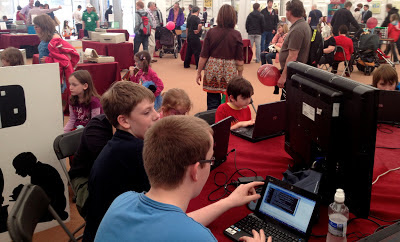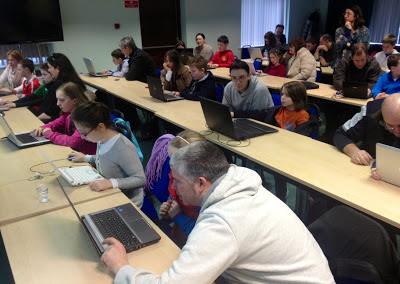Back to the Future!
Over the last few years, Galway has undergone a remarkable digital
renaissance that has brought back memories of the city in the 1980s when
Digital Equipment Corporation (DEC), then the world’s largest minicomputer
manufacturing corporation, was exporting computers all across Europe from its
factory in Ballybrit; when the first satellite link between Ireland and North
America was established at the state telephone company’s HQ in Mervue; when parents
were buying their first ever microcomputers such as the Sinclair ZX81 and
Commodore Vic 20 in computer retail outlets that were springing up across the
city so that their children could learn the new art of coding; when a few
visionary young mathematics, business and physics teachers were introducing
computers into the schools; when DEC had linked the city’s second level
colleges through a computer network system;
 |
| Early 1980s: DEC Galway had computer links to 10 second-level schools |
when recently qualified college
graduates were establishing ‘software houses’ in little backwater offices; when
small-to-medium companies en-masse were buying their first computers to run
their accounts and send out letters; when the Ireland’s first Internet
newsletter for worldwide
readership was being distributed by DEC’s Liam Ferrie; when electronic courses
at the Regional Technical College were filled to capacity; when Apple’s Macintosh
Destktop Publishing system let to the appearance of regular low cost community
newsletters across the suburbs; when
new programming courses could not keep up with the demand from enthusiasts of
all ages; and when students at Galway University (NUIG) were brought up before
the authorities for accessing the college computer
systems by circumventing its security system (what we now call ‘hacking’!).

12 yr old Harry Moran demonstrating his PizzaBot App to a spellbound audience during the
Galway Science & Technology Festival Exhibition
Once again a vibrant Digital ambiance
is starting to permeate the schools, colleges, workplaces and streets of the
city and county fueled by a volunteer army of largely young enthusiastic and
selfless Internet activists the like of which exists nowhere else in Ireland.
However as with the recent establishment of the Ballinfoile Mór Cumann na bhFear/Men's Shed, it is about Irish people recapturing the ability to use their hands and intellect to make things again rather than just be the passive recipients of items imported from overseas.
We are beginning to move away from being a nation of digital users to a nation of digital creators.
The increasing roll-out of coding classes to schools provided by volunteers from the corporate
sector, NUIG, GMIT and from concerned individuals; the annual hosting of a
national children’s Lego Robotics competition;
the IT summer camps at NUI Galway; the establishment of groups such as 091Labs, Camara and Coder Dojos; the
high uptake by older peoples and other communities of Web Awareness courses; the massive crowds that attended events held
during the Galway Science &
Technology Festival (24,000+ at the Sunday Fair on NUIG campus); the existence
at NUIG of world-renowned science
research institutes such as DERI; the establishment of Ireland’s only Computer and Communications Museum (at
DERI) and the presence of global
technology leaders in the city such as Hewlett-Packard, Cisco, EA,
Medtronic and IBM is radically changing the local landscape that in time could
metamorphose into an innovative sustainable Knowledge economy and society providing
a healthy future for Ireland that will benefit other countries across the
planet.
As Community/Education Outreach Officer at the Digital
Enterprise Research Institute (DERI) at NUI Galway, I am part of this process
of change which involves some very exciting initiatives.
1. Launch of Galway City 'Coder Dojos' Club
Galway Coder Dojos first group of volunteers with founder Adrian Bannon on the extreme right
The city’s first Coder Dojo club will be launched next
Saturday in DERI. The engine behind this initiative is young local lawyer Adrian
Bannon supported by a merry band of enthusiasts including Padraic Hartley of
091Labs ‘hackerspace’ group and Michael Madden of IT NUI Galway. The new club will meet weekly in DERI
before transferring in early April to the College of Engineering & Informatics located on the main campus.
It will provide an opportunity for students, pupils, teachers and technology enthusiasts to meet like-minded peers in an informal social and learning environment
where they will be educated
in new skills particularly in
coding and generate interesting
ideas and discussions amongst themselves. It is anticipated that, over time,
this pioneering club will led to the setting up of Coder Dojo clubs in schools
across Galway city and county.
2. Scratch Programming
Courses in Galway Primary Schools
Children displaying their Scratch project to their fellow classmates
Computer Science is unfortunately not a subject in the Irish
schools system which is symptomatic of a systematic failure by successive governments
who have failed to grasp the serious damage that its absence from the
educational curricula is doing to the country’s future.
Since early 2011, I have campaigned and organised cross-sectoral
groups to lobby ministers on this issue and will soon be part of a delegation to meet Seán Sherlock T.D., Minister of State with responsibility for
Research and Innovation, on this issue.
Over the last year, I have enjoyed teaching Scratch
programming in primary schools in Galway and Mayo, complementing the excellent
work being spearheaded by LERO nationwide It has been personally very rewarding
for me to see the practical effects of this initiative through the creation of
an array of fascinating computer animation projects by the young participants.
DERI is now collaborating with Hewlett Packard, GMIT and the Galway Education Centre to ensure that
even more schools can benefit from
mentor-assisted classroom computer programming courses. The project will be
known as HP Headstart. On behalf of
DERI, I will be acting as project coordinator and over the next few weeks I will be
teaching Scratch to the DERI, HP and GMIT mentors. Tuition will be held in participating schools and consist of
one-hour classes over a period of six weeks.
3. Galway city’s only After-School
Computer Club
DERI's Michael Kerrin teaching Python at St. Mary's Computer Club
Last year, Laura Dragan
and Pierre Ludwick from DERI provided
an after-schools C++ programming course to students at St. Mary’s College. This
after-school club, the only one of its kind in Galway, was very well received
and it continues this year with DERI’s Michael
Kerrin teaching Python.
4. ‘Bullding a Mobile App’ Workshop
DERI’s Caoilfhionn Lane will provide a workshop on ‘How
to Build A Mobile App’ at 7pm on Tuesday February 28th in DERI. Open
to the general public, the aim of this workshop is to show beginner or non-programmers how to
create a simple phone app using Eclipse and the Android SDK. They would learn
how to install the Android SDK and the Android Phone Emulator and explore a
sample game, ’Lunar Landing’.
5. Retro Games Night, March
2nd, Computer Museum
SuperFrog on the Amiga (World's first multi-media computer)
A Retro Gaming Night will be held at 7pm on Friday March 2nd
in the DERI-based Computer and Communications Museum of Ireland.
The event will allow visitors to play classic games such as Sonic the Hegehog, Donkey King, Pacman, Asteroids,
Space Invaders and Super Frog on an array of vintage microcomputers &
consoles (late 1970s-mid1990s) that include Atari, Sega Mega Drive, Playstation
1, Nintendo Gameboy, Amiga & Commodore 64.
6. Computer and
Communications Museum of Ireland
Visitors interacting with the Museum's artifacts
The facility, established by and presently housed in DERI, is
officially recognised as the Computer and Communications Museum of Ireland and
has become part of a Galway science trail.
It has a cross-sectoral Board that draws its membership from
HP, GMIT, NUIG, Engineers Ireland, small businesses as well as DERI (Mike Turley, Lukasz and myself).
Its primary aim is to introduce visitors to the rich
communications technology heritage of Ireland and of the world and to inspire
young people towards innovation, science and engineering.
For National Engineers Week (Feb 27 – March 2nd),
I am augmenting the present collection of artefacts with some exciting new additions
including one of the finger controlled keysets that was invented and used by Douglas Engelbart
in his legendary ‘Mother of all Demos’
(1968) that is on loan from Karl Flannery
of Storm Technology, as well as a
library of 1960s Science Fiction comics, films and toys
that inspired children of that era to create so many of the technologies we use
today.
7. Visits to Schools
& Student Tours of DERI
Post-primary students visiting the DERI science institute at Galway University (NUIG)
Second-level schools will visit our institute during National Engineers Week (Feb 27 – March 2 and DERI personnel will travel out to at least
one school during this period.
These tours and
visits will give students the opportunity to meet with DERI researchers and
find out about the work and the exciting leading edge products, processes and
services being created at DERI.
They are also
part of a larger network of tours that cover four other world-class science institute
specialsing in research varying from climate change, to biomedical to optics.
















